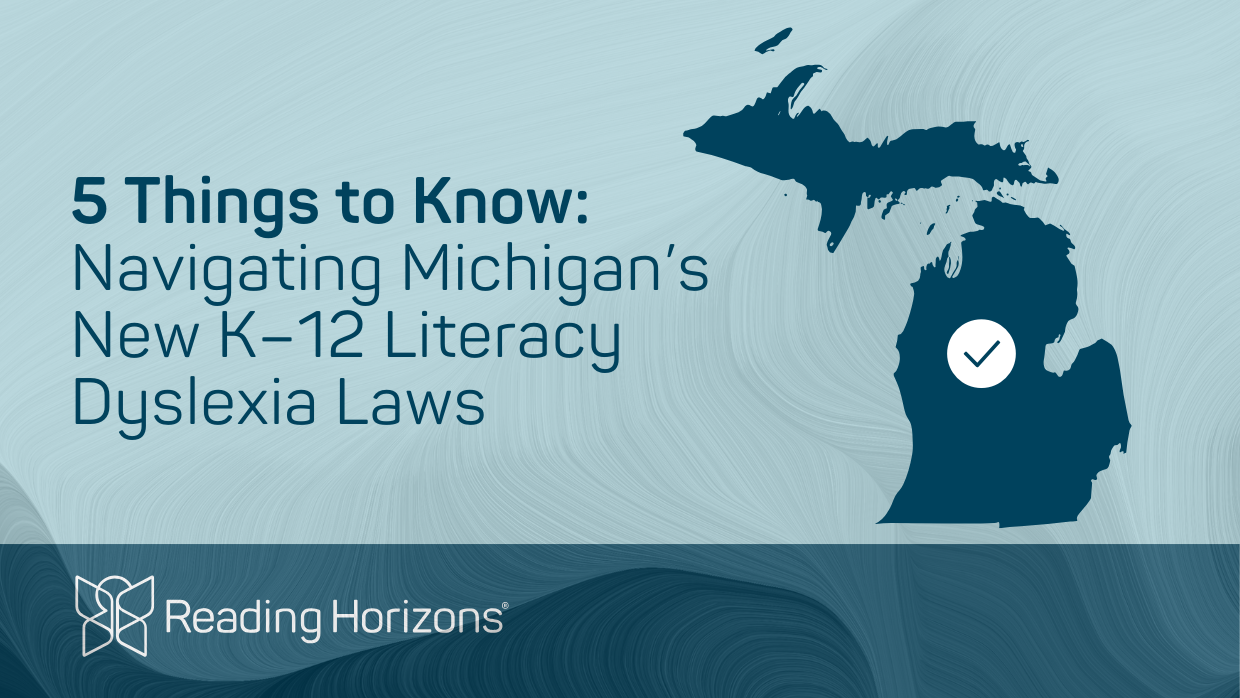By Jill Erfourth, District K–6 Literacy Consultant, Elementary ELA Co-Chair, Utica Community Schools, and Morgan Sangalli, Literacy Consultant, Reading Horizons
Michigan’s new literacy dyslexia laws (Public Acts 146 & 147) mark the most significant shift in reading policy in more than two decades. But for those in the trenches, it’s not just about a new mandate—it’s a fundamental shift in how we teach children to read. And most importantly, it’s about improving literacy achievement and outcomes for K–12 learners.
Before diving into the mandates, it’s crucial to understand the why behind this legislative push. For years, Michigan’s reading scores have remained stagnant; as of 2024, the state ranked 43rd nationally in 4th-grade reading proficiency. While previous efforts, such as the “Read by Grade Three” law, focused on retention, they didn’t fully address the root cause of the 15–20% of students with characteristics of dyslexia.
The “Why” Beyond the Scores: Cognitive Science & Oral Language
This legislative push is grounded in the science of reading and the science of learning. We now understand that literacy isn’t a natural process like speaking; it is a neurological feat that requires explicit instruction. At its core, oral language is the foundation for literacy development. These laws acknowledge that a child’s ability to understand and use spoken language is the precursor to decoding the written word.
Furthermore, Public Act 147 addresses the source of the teacher pipeline: Educator Preparation Providers. Our higher ed programs must make these shifts so that teachers in colleges of education enter the classroom with this foundational knowledge—the Science of Reading (SoR)—of how we learn to read and how we, as educators, teach reading and writing! By ensuring new teachers are equipped with cognitive science before day one, we stop the cycle of “learning on the fly.”
These new laws shift the focus from consequence to prevention. By codifying the Science of Reading, Michigan is moving away from practices that relied heavily on cueing and leveled-text guessing strategies—approaches that research has shown are insufficient for students with decoding difficulties. The goal is simple but ambitious: to ensure every child—regardless of neurodiversity—receives the explicit, evidence-based instruction they need before they fall behind.
Based on the latest guidance and expert insights, here’s what you need to know about the goals, shifts, and high-stakes curriculum decisions ahead.
1. Identification, Not Just Diagnosis
The driving force behind this new legislation is prevention through early identification. Rather than waiting for students to fail and qualify for services or a diagnosis, the law prioritizes recognizing dyslexia characteristics early, when evidence-based intervention can have the greatest impact.
The Shift: We aren’t asking teachers to become clinical diagnosticians. Instead, the law requires screening for characteristics and markers of dyslexia (such as decoding and word recognition difficulties).
The Timeline: Screening begins 3 times per year for K-3 students, and assessments/screeners must be in place for K-12 students who show “red flags” (such as escape behaviors or laborious reading) by the 2027-28 school year.
The “Screening Gap” (Grades 4-12): While the MDE has published an approved list of K-3 screeners, there has been no further clarification on 4-12 screeners. However, the law specifies characteristics that, if present in grades 4-12, trigger a screening. It’s important to note that the MDE is maintaining an “open window” policy, allowing additional opportunities for vendors to submit both screeners and curricula for approval.
2. The Instructional Pivot
Perhaps the most significant change is the move away from Balanced Literacy and the “Three-Cueing” method. These laws effectively mark the end of “guessing” as a reading strategy in Michigan classrooms, and signal a shift toward structured literacy—an explicit, systematic, and cumulative approach to teaching decoding, spelling, and language comprehension.
- Code Emphasis: Instruction must now prioritize “code-based” learning—direct, explicit instruction on sounds, syllables, and morphemes. This requires a systematic scope and sequence for teaching sound-spelling correspondences.
- Knowledge-Building: The shift isn’t just about phonics. Grounded in the science of reading, the new law recognizes that skilled reading is both word recognition and language comprehension. Structured literacy addresses the word recognition strand through explicit and systematic instruction. High-quality, knowledge-building curricula develop language comprehension through rich vocabulary, syntax, and background knowledge.
- Reading & Writing Reciprocity: Writing shouldn’t happen in isolation. The new laws encourage writing that is integrated and reciprocal to reading instruction. Evidence-based literacy practices grounded in the Science of Reading include explicit instruction in both word recognition and written expression. Structured literacy supports this reciprocity: as students learn sound-spelling correspondences and morphology for decoding, they apply that same knowledge in encoding and composition. Writing is embedded to support reading and comprehension, incorporating both transcription (the “how” of writing) and composition (the “what”) through explicit instruction.
3. Evaluating the “Approved” List
The Michigan Department of Education (MDE) has released an approved list of Tier 1 curricula and screening tools. However, a “stamp of approval” is the beginning of the process, not the end. Districts must ensure their chosen tools actually fit their specific MTSS (Multi-Tiered System of Support) framework.
When evaluating a curriculum, don’t just ask if it’s “approved.” Ask:
- Does the Scope and Sequence make sense? Is it systematic and cumulative?
- Is encoding part of the daily routine? If students are decoding (reading), they should be encoding (writing/spelling) the same patterns simultaneously to reinforce the neural pathways.
- Does it pass the “Rope” test? Use tools like The Reading League (TRL) Curriculum Evaluation Guidelines to see if the curriculum addresses all strands of Scarborough’s Reading Rope—from phonological awareness to verbal reasoning.
4. Moving Beyond Compliance
It’s easy to get lost in the “must-dos,” but the real goal is meaningful support. Compliance keeps the lawyers away; instruction keeps the students growing.
- Classroom Decision-Making: Universal screening should drive both instructional grouping decisions and the intentional allocation of small-group intervention time aligned to targeted skills. It’s about using data to drive instruction now, not waiting for state test results in the spring.
- Professional Learning & The “Why”: We must provide educators with high-quality professional learning alongside new curriculum implementation. Teachers need to understand the alignment to SoR and evidence-based instruction to move from implementing with “fidelity” (rigidly following a script) to implementing with integrity. This means teachers use professional judgment to modify instruction based on their class’s needs, without removing or replacing core evidence-based components.
- Preserving Professional Judgment: Use the approved lists as a floor, not a ceiling. Teachers should be empowered to use their judgment within an MTSS framework to intensify support for students who aren’t responding to Tier 1 instruction.
5. Managing Expectations
The data won’t change overnight. Decades of instructional habits and systemic gaps take time to bridge. While we all want to see “the needle move” on state testing (M-STEP), the first signs of success will be local.
- Look for “Transfer”: Are students applying their phonics knowledge to their independent writing?
- Monitor Growth Locally: Use your local data—including screeners, diagnostic assessments, and progress monitoring (like NWEA or STEP)—to track progress month to month. If the needle is moving locally, the state scores will eventually follow.
What’s Next for Your District? The 2026–27 school year is the bridge year. Connect with the Reading Horizons team to plan your next steps.

